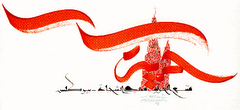If #KhaderAdnan was a Jewish terrorist, he might be free
As I write this, Khader Adnan is near death, on the 63rd day of a hunger strike to protest his detention without charges by Israeli occupation authorities. Having been seized on December 17 in the middle of the night by Israeli soldiers, jailed without trial, humiliated and abused, Adnan is waging one of the longest hunger strikes in Palestinian history. A 33-year-old baker, Adnan has been an activist in the popular resistance faction Palestinian Islamic Jihad for several years, but has never been implicated in any act of violence. As with the more than 300 Palestinians held by Israel in administrative detention, Israeli military authorities refuse to say why Adnan was imprisoned. Human Rights Watch has demanded that Israel "immediately charge or release" Adnan, as has Amnesty International. But the Israeli authorities continue to ignore the pleas of human rights groups.
Unfortunately for Adnan, he was not a Jewish terror suspect.
In July 2010, Jerusalem police arrested a Jewish extremist named Chaim Pearlman. Pearlman was the prime suspect in a cold-blooded settler stabbing spree that left four Palestinians dead. Pearlman had previously engaged in acts of random violence against Palestinians, while maintaining an active role in the Kach terrorist organization. For ten days, the Shin Bet intelligence service subjected him to harsh interrogations while denying him access to legal counsel. Finally, Israeli High Court Justice Edmund Levy admonished the Shin Bet for refusing to produce evidence of Pearlman's guilt. "Never in my life have I seen such behavior," Levy claimed, despite having presided over numerous cases of Palestinian Israelis detained in a similarly lawless fashion.
Haaretz, the liberal Israeli daily, reacted with shock to Pearlman's treatment, proclaiming in an editorial that "the Shin Bet must mend its ways." The editors declared that while prosecuting Jewish terrorism is important, "the ends do not justify the means." "Even the war against terror must be conducted using legal means," the Haaretz editors harumphed. After Justice Levy refused to extend Pearlman's detention by 8 days, Pearlman was set free and greeted by a cheering crowd of Jewish extremists.
The Israeli High Court has yet to demand evidence of Adnan's guilt. Nor have any voices in the mainstream of Israeli opinion expressed their indignation at his treatment. Instead, a military appeals court has ruled that Adnan must stay in detention until at least May. One of Adnan's hands and both of his feet are shackled to a bed at a hospital in Safed. His wife keeps a poster in the family's living room that features his image above a caption. It reads, "My honor is more important than my food."
Unfortunately for Adnan, he was not a Jewish terror suspect.
In July 2010, Jerusalem police arrested a Jewish extremist named Chaim Pearlman. Pearlman was the prime suspect in a cold-blooded settler stabbing spree that left four Palestinians dead. Pearlman had previously engaged in acts of random violence against Palestinians, while maintaining an active role in the Kach terrorist organization. For ten days, the Shin Bet intelligence service subjected him to harsh interrogations while denying him access to legal counsel. Finally, Israeli High Court Justice Edmund Levy admonished the Shin Bet for refusing to produce evidence of Pearlman's guilt. "Never in my life have I seen such behavior," Levy claimed, despite having presided over numerous cases of Palestinian Israelis detained in a similarly lawless fashion.
Haaretz, the liberal Israeli daily, reacted with shock to Pearlman's treatment, proclaiming in an editorial that "the Shin Bet must mend its ways." The editors declared that while prosecuting Jewish terrorism is important, "the ends do not justify the means." "Even the war against terror must be conducted using legal means," the Haaretz editors harumphed. After Justice Levy refused to extend Pearlman's detention by 8 days, Pearlman was set free and greeted by a cheering crowd of Jewish extremists.
The Israeli High Court has yet to demand evidence of Adnan's guilt. Nor have any voices in the mainstream of Israeli opinion expressed their indignation at his treatment. Instead, a military appeals court has ruled that Adnan must stay in detention until at least May. One of Adnan's hands and both of his feet are shackled to a bed at a hospital in Safed. His wife keeps a poster in the family's living room that features his image above a caption. It reads, "My honor is more important than my food."






Aucun commentaire:
Enregistrer un commentaire